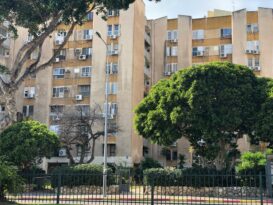Policies that were on the verge of approval will be frozen, including the move not to link new apartment prices to the Construction Cost Index as well as increased tax benefits for first-time home-buyers. Those that already passed, however, such as the “Apartment at a Discount” campaign, will continue as usual. Buyitinisrael presents a summary of how the collapse of the government and the run-up to the elections in Israel may affect housing prices.
The end of the Bennett-Lapid government will likely have a significant impact on Israel’s ability to effectively deal with rising apartment prices, as many policies that were on the verge of legislation will be put on the backburner by the interim government. As Israel plans for its fifth elections in under four years, Buyitinisrael lists the main policies that relate to Israel real estate that will be put on hold, and which will continue to move forward.
Canceling the linkage of apartment prices to the Construction Cost Index
Initiated by Members of Knesset from the Opposition, this widely discussed move was ultimately adopted by the Ministry of Housing and Construction. According to the amendment, contractors would no longer be able to link apartment prices as a whole to the Construction Input Index, rather only the components of the price that are actually impacted by construction costs. Today, developers link the total price of an apartment to the index, despite the fact that many factors that make up the price have nothing to do with construction costs, including the cost of land, various fees and taxes, and the percentage of profit that goes to the developers.
Despite the fact that this necessary and logical amendment is supported by many MKs from the Opposition, it seems that the legislation will not go through in the final days of the current government. However, buyers can take comfort in the fact that the Israel Land Authority recently approved regulations that nullify the link for all new apartments that will be built on Stand land and marketed to contractors from now on. This constitutes about 60% of all new construction.
Reducing purchase tax for those buying single apartments and increasing tax on luxury apartments
Another move that will likely be canceled or postponed to an unknown date is updating the purchase tax brackets for those buying single apartments. According to the current plan that was being advanced, tax rates were supposed to be reduced for those buying an apartment of up to NIS 3 million, while significantly increased for those buying luxury apartments of NIS 5 million or more. Meanwhile, the Ministry of Finance has requested to increase the cap on total exemptions from purchase tax from about NIS 1.8 million today to approximately NIS 2 million.
Incentivizing local authorities to promote residential construction
One of the main obstacles to increasing Israel’s housing supply is the strong opposition of local municipalities to large residential construction projects, which are considered unprofitable. Authorities collect relatively low property taxes for residential buildings, while the scope of services they are obligated to provide to residents is expensive, including education, culture, sanitation, and more. Meanwhile, the situation is the exact opposite of the construction of office buildings. In order to change the current reality, the current government recently drafted a law to change the property tax structure in a way that would encourage local authorities to build more housing and fewer commercial buildings and office spaces. However, with the collapse of the government, this draft will no longer become law.
In addition, the current Ministers of Housing and Finance were advancing a policy that would use the revenues of the Israel Land Authority to fund a grant program for local authorities that cooperated with the Ministry of Housing. Municipalities that agreed to build large residential neighborhoods would be paid NIS 30,000 for each apartment that received a building permit, where the money would go toward establishing public institutions. This policy will also be put on pause.
However, there is another method for incentivizing municipalities that should continue to operate as usual: the concept of umbrella agreements. In this model, the government signs an agreement with an authority to build a certain amount of housing units (usually between 5,000 and 20,000), and in exchange for this, commit to executing the related projects that would be required by the authority, such as constructing new interchanges or financing public parks.
Shaked’s TAMA 38 Replacement Plan
TAMA 38 is currently Israel’s central urban renewal plan in Israel and the only one that provides a solution for the renewal of a single building, as opposed to the pinui-binui program (evacuation-construction), which only applies to a complex with several buildings. TAMA 38 is set to expire in October 2023. It was going to be replaced by MK Ayelet Shaked’s plan which would enable the continued renewal of plots, albeit on a smaller scale. Legislation for the alternative plan began this past winter and was supposed to pass a second and third reading in the summer session. However, as Israelis go back to the polls, this will no longer happen.
One major initiative that will continue according to plan
As we have seen, the initiatives that will be frozen as a result of elections include both new policies that the government has been trying to promote as well as amendments that would change existing policies. However, policies that were passed prior to the dissolution of the government will continue to roll out as planned. Therefore, Dira b’Hanacha or “Apartment at a Discount,” the government campaign to market subsidized apartments to first-time home buyers, is expected to continue as usual. In fact, a large lottery for the purchase of about 5,000 discounted apartments across the country is expected to take place next week.
Not only that, but the Israel Land Authority recently agreed to increase the percentage of apartments that will be allocated for discounted purchase in each of the tenders from 60%, as stipulated in the original plan, to 80%. This will increase the number of apartments available to first-time home buyers at a discounted rate.
While the government may no longer have the authority to approve new decisions that would bring down home prices, it will continue to receive “assistance” in this area from the Bank of Israel (BOI) in the coming weeks without taking any further steps. As is well known, the BOI recently increased the interest rate from 0.1% to 0.75% and intends to continue on this path in the coming months. This move is unanimously expected to significantly reduce the demand for apartments, thereby curbing prices.
However, if we revert to a prolonged period in which there is no one managing the housing market, this will hurt buyers and tenants, in the long run, as an orderly and consistent policy is needed today more than ever.








